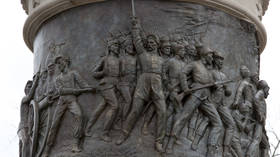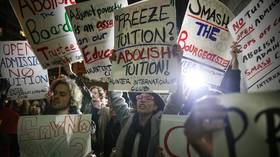Is civil war possible in modern-day America?

Compared to the political background that led to the Civil War of 1861-65, when the nation was torn over slavery, it is difficult to name just one primary issue separating Americans today. Is the United States doomed to repeat history?
No other developed country in the world frets over the possibility of a civil war more than the United States. Perhaps that’s because the memory of the first one (1861-65), the deadliest military conflict in American history, was so utterly devastating that it is impossible to shake. Or maybe Americans genuinely see no other way out of the impasse they currently face than by going to war against themselves.
In yet another one of those perennial polls that seem determined to inspire a self-fulfilling prophecy, The Economist and YouGov asked Americans about changes in the US political climate. Two in five of the respondents believe a civil war is at least “somewhat likely” in the next decade; Republicans are more likely than Democrats to expect civil war. Few see things improving in the coming years: 62% expect an increase in political divisions.
It could almost be argued that the United States, having suffered a long, hot summer of Black Lives Matter protests, followed by the storming of the Capitol on January 6, is already experiencing a civil war, but it just hasn’t been officially announced yet. Is it necessary to have another Battle of Gettysburg with standing armies and thousands dead to fit the definition of ‘civil war’? In any case, the FBI raid on Mar-A-Lago, Donald Trump’s Florida estate, certainly underscored the climate of political divisiveness as a prelude to major unrest. Republicans saw this as the latest proof that the establishment has no interest in playing by the rules. The “weaponized federal agencies” that tend to move so swift and viciously against the right, conservatives argue, never show the same enthusiasm when addressing the alleged wrongs of the left.
Meanwhile, the situation on the cultural front seems no less tenable. We’re talking about a country that is 65% Christian and 50% Conservative struggling to come to grips with an explosion of fiercely controversial ideas – from Critical Race Theory, which seeks to blame the white race for all of the problems now besetting minorities, to transgenderism, which postulates the idea that gender is not determined by the physical sex of an individual, but rather whatever he or she (or they, or any of the open list of pronouns) believes himself to be. And how many Drag Queen Story Hours can the public mind handle before something gives?
Tomorrow is war. Sleep well.
— Steven Crowder (@scrowder) August 9, 2022
What many Americans find so unsustainable is that there seems to be no escape, no way of opting out, no way of protecting even the children from the cultural sea changes underway. Last year, Stacy Langton, a mother of six from Virginia, confronted teachers during a school board meeting over books that are available to students in the school library. Carrying titles like ‘Lawn Boy’ and ‘Gender Queer: A Memoir’, the books depicted sex between men and boys, with one describing a fourth-grader performing oral sex on an adult male. Despite the uproar the revelations caused, the school district refused to remove the books from the shelves as the political temperature in the United States rose another degree.
So while it is not difficult to demonstrate that there is a veritable chasm now separating the American people, does that prove civil war is on the horizon? Nobody knows. The exact breaking point that causes people to say ‘enough’ and take up arms against their brethren has yet to be established. Perhaps the conditions for civil war are even riper now than they were in Lincoln’s day, but Americans have simply become too comfortable and self-satisfied to fight. While there will always be a few impulsive youth with nothing to lose to join the rabble, convincing the bulk of the US middle class to give up their cushiony Netflix lifestyles just to fight for a cause seems very unlikely. The rugged, pioneering spirit that defined the times in 1861 is a far cry from its modern incarnation. Today, many Americans are content to wage ‘civil war’ over social media, debating the issues against faceless opponents while the country beyond their window becomes an increasingly violent place.
Although it seems unlikely that the United States will disintegrate into pitched battles anytime soon, it can’t be forgotten that there are more guns in the nation’s closet than internet subscriptions. This gives those frustrated individuals the means to ‘express themselves’ without the need to wait for the bugle call. Thus, instead of witnessing a replay of Fort Sumpter, Americans can expect to see a rash of individual actors lashing out in desperation at a society they no longer understand.
As a wit once said, ‘History seldom repeats itself, but it does rhyme.’
The statements, views and opinions expressed in this column are solely those of the author and do not necessarily represent those of RT.















